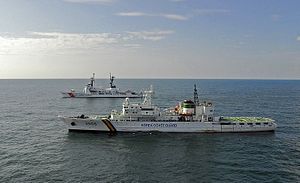Following the sinking of the Sewol ferry earlier this year, South Korean President Park Geun-hye vowed to disband the country’s coast guard for its mishandling of rescue operations.
The announcement came during a nationally televised speech, during which President Park apologized to the nation for her failure to manage the crisis adequately. Progressives were skeptical of her intentions. Reporters for the Hankyoreh equated her declaration to disband the coast guard with “shock therapy,” noting that the president hadn’t consulted anyone outside the Blue House as to how or why she came to the this decision.
But reporters for the Hankyoreh, or anyone else for that matter, shouldn’t dwell on the announcement. Park likely never intended to disband the coast guard. It simply isn’t that easy to get rid of a major state institution. Nor is it a good idea, as the latest confrontation with Chinese fishermen in the Yellow Sea indicates.
On October 10, the South Korean coast guard clashed with Chinese fishermen in Korea’s maritime exclusive economic zone (EEZ). After 10 officers seized control of a Chinese fishing vessel operating illegally in South Korean waters, Chinese fishermen from other ships boarded the captured vessel after it experienced engine trouble and stopped in the water. A violent confrontation took place between officers on board the captured vessel and fishermen from the other, newly arrived vessels. The confrontation resulted in the shooting of a Chinese captain from one of the other vessels. The captain eventually died.
Sadly, this isn’t the first fatality to result from confrontation between the South Korean Coast Guard and Chinese fishermen. In 2011, an officer from the coast guard was killed while attempting to board a Chinese vessel caught in South Korea’s territorial waters.
Given that more than 100 Chinese vessels operate near South Korea’s territorial waters during peak fishing season, largely a consequence of North Korea selling fishing rights to China, more violent confrontations are likely. These confrontations have ignited a debate about maritime safety and security, leading some members of South Korea’s National Assembly to propose ways of enhancing the power of the coast guard rather than disbanding it.
According to the Chosun Ilbo, South Korea’s state audit agency (a bipartisan group of lawmakers) is debating ways to improve the coast guard. Members from the ruling and opposition parties agree that certain functional improvements are preferable to abolishment. Saenuri wants to give the coast guard prosecutory powers, effectively transforming it into a type of “sea police,” so that it can prosecute those committing crimes on the high seas (e.g. Chinese fishermen). The opposition New Politics Alliance for Democracy wants significantly less ambitious improvements. It seeks to equip the coast guard with a preparation manual for dealing with large-scale accidents; apparently it didn’t have such a manual before. This could explain the bungled response to the Sewol incident.
While the audit agency has called on the Ministry of Maritime Affairs to discipline the head of the coast guard and “49 other officials from maritime rescue bodies,” including Nam Sang-ho (head of the National Emergency management Agency), it appears that President Park’s vow to abolish the coast guard was little more than a political gesture (or perhaps a form of “shock therapy”), meant to appease an angry public.
































